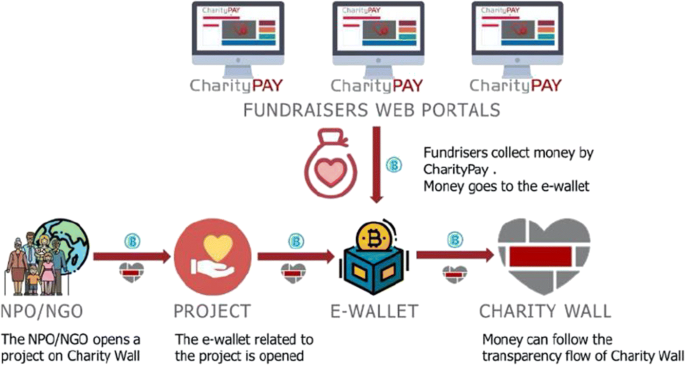Cryptomomen.com – The advent of blockchain technology and its subsequent use in cryptocurrencies has propelled the charitable sector into a new era of giving.
Crypto for Good, a burgeoning initiative powered by blockchain, is revolutionizing the way we support causes close to our hearts.
In this paradigm shift, donors can now make instant, transparent, and globally accessible donations that bypass traditional intermediaries and directly reach intended beneficiaries, maximizing the impact of every contribution.
Introduction

Empowered by the transformative power of blockchain, crypto philanthropy has emerged as a revolutionary force in the charitable landscape. This novel approach leverages the decentralized and transparent nature of blockchain technology to facilitate efficient, secure, and auditable donations.
By harnessing the immutability of distributed ledgers, crypto philanthropists can ensure that their contributions reach their intended beneficiaries directly, minimizing the risk of fraud or mismanagement.
Furthermore, the real-time visibility and traceability afforded by blockchain technology empowers donors with unparalleled transparency into the impact of their donations, fostering trust and accountability within the philanthropic ecosystem.
Thank you for visiting Cryptomomen.com
Importance of charitable giving
Cryptocurrency and blockchain technology have revolutionized charitable giving, enabling seamless, secure, and transparent donations.
Crypto philanthropy allows donors to contribute directly to causes without intermediaries, reducing overhead costs.
The decentralized nature of blockchain ensures transparency and accountability, allowing donors to track the impact of their donations.
Additionally, smart contracts enable automated donations and ensure funds are used for their intended purposes.
By embracing these cutting-edge technologies, charities can expand their reach, engage new donors, and maximize the impact of their work.
Challenges of traditional charitable giving methods
Traditional charitable giving methods face challenges such as limited transparency, high transaction fees, and slow processing times. Crypto philanthropy, leveraging blockchain technology, offers solutions to these challenges. It allows for secure, transparent, and cost-effective donations.
Q1: How does crypto philanthropy address transparency concerns?
A1: Blockchain records transactions immutably, providing a traceable and auditable history of donations.
Q2: What advantages do donors gain from using blockchain technology?
A2: Donors can gain tax benefits, reduce transaction costs, and increase the efficiency of their donations.
Blockchain Technology in Charitable Giving

Empowering charitable giving through blockchain technology introduces transparency and efficiency into the donation process.
Crypto philanthropy leverages digital currencies for donations, enabling secure and traceable transactions.
Blockchain platforms provide immutable records, ensuring the integrity of transactions and allowing donors to track the impact of their contributions.
By eliminating intermediaries and reducing administrative costs, blockchain technology facilitates greater accountability and maximizes the impact of charitable funds.
What is blockchain?
Blockchain technology is a revolutionary decentralized ledger system that has the potential to transform industries and create new opportunities for social impact.
Unlike traditional centralized systems, blockchain operates on a distributed network, ensuring transparency, security, and immutability.
This makes it an ideal platform for crypto philanthropy, enabling secure and efficient tracking of donations, verifying the authenticity of charitable organizations, and facilitating direct support to beneficiaries.
By leveraging blockchain’s unique capabilities, crypto philanthropy can empower individuals and organizations to make a meaningful contribution to society, fostering transparency, accountability, and positive impact.
Key benefits of blockchain for charities: Transparency, security, efficiency
Three key benefits of blockchain technology for charities are transparency, security, and efficiency.
Transparency is enhanced through secure, immutable records, ensuring donations are accounted for and reducing the risk of fraud.
Security is bolstered by the decentralized and encrypted nature of blockchain, safeguarding sensitive donor information.
Efficiency is improved through streamlined donation processing and automated workflows, saving charities time and resources.
Types of Crypto Donations

Cryptocurrency donations are increasingly popular, providing donors with a transparent and secure way to support charitable causes.
Blockchain technology enables secure and auditable transactions, increasing trust and accountability.
These donations can take various forms, including crypto philanthropy and donations to organizations that accept cryptocurrency.
Cryptocurrencies: Bitcoin, Ethereum, etc.
In the rapidly evolving realm of finance, cryptocurrencies like Bitcoin and Ethereum have emerged as a revolutionary force.
These digital assets, underpinned by the transformative blockchain technology, have garnered significant attention not only for their investment potential but also for their transformative impact.
Crypto philanthropy has emerged as a novel and impactful area, whereby individuals and organizations harness the power of cryptocurrencies to support charitable causes, leveraging the transparency and efficiency afforded by blockchain technology.
Key to understanding the significance of cryptocurrencies and blockchain technology in the context of philanthropy is their potential to enhance financial inclusion, empower charitable organizations, and foster greater transparency and accountability in the distribution of funds.
Stablecoins: USDT, USDC, etc.

In the realm of crypto philanthropy, stablecoins like USDT and USDC play a significant role.
These digital currencies, pegged to the value of the US dollar, provide stable funding for non-profit organizations operating in volatile crypto markets.
Their adoption offers a secure and transparent medium for crypto donations, enabling donors to participate in charitable initiatives with confidence.
Furthermore, stablecoin-driven philanthropy leverages blockchain technology to increase accountability and traceability, ensuring that funds reach their intended recipients with minimal overhead.
NFTs: Unique digital collectibles
Non-fungible tokens (NFTs) are one-of-a-kind digital assets that represent ownership of unique items such as art, collectibles, and virtual real estate. NFTs are stored on a blockchain, a secure, distributed digital ledger, which verifies their authenticity and scarcity.
They have gained prominence in the realm of crypto philanthropy, where collectors and organizations use NFTs to support charitable causes.
By selling or auctioning these digital assets, creators and collectors can generate funds for important initiatives, fostering a positive impact through the intersection of art, technology, and social responsibility.
Thanks for reading
As we stand at the cusp of a new era in charitable giving, the transformative potential of blockchain technology is undeniable.
Its ability to increase transparency, reduce costs, and empower donors with greater control over their contributions is revolutionizing the way we support causes near and dear to our hearts. By harnessing the power of blockchain, we are unlocking new possibilities for driving social impact, ensuring that every dollar donated makes a meaningful difference in the lives of those in need.
As we bid farewell to another illuminating exploration into the intersection of crypto and philanthropy, let us not forget to share this transformative knowledge with our friends and communities.
Together, we can continue to shape a future where blockchain-powered charitable giving empowers individuals and organizations to make a lasting impact on the world. Thank you for joining us on this journey.



